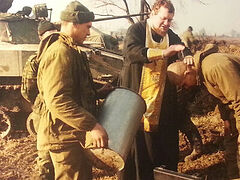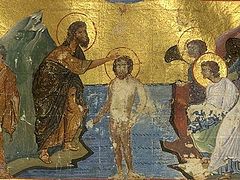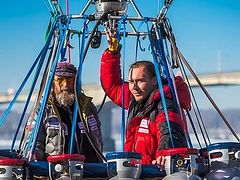The Russian globetrotter Sergei Sinelnik, with a company of trustful crewmembers, has been sailing around the globe on a wooden boat called the “Pilgrim,” a replica of an eighteenth-century coastal boat from the Russian North. Courtesy of the “grapevine telegraph,” someone has already labeled his voyage “prayerful,” even though Sergei once told me: “We are no men of prayer, that’s for sure!”
I was on board the “Pilgrim” (as a visitor only!) and saw that, for her captain and the crew, Orthodoxy is not just another word. It’s not that the sailboat is stocked full of crosses and icons and even miniature churches in a tiny museum of wooden architecture onboard. The crewmembers carry their Russian faith in their hearts and talk about it and the Russian culture with the people they meet on their way—that’s what matters the most.
For the last three years, the “Pilgrim’s” voyage that started in 2017 in Petrozavodsk, has prowled the waters near the American continent. During the voyage, excluding overwintering, Sinelnik stays on board while other crew members work alternate shifts. Because of the pandemics, she had an unplanned overwintering in the USA, but was still able to reach Alaska. Compared to what has already been sailed—and this includes Europe, Cabo Verde, the islands of the Caribbean—she’s got just a little left to go to Chukotka. In his interview with Pravosalvie.ru, Sergei spoke about this year’s voyage, Russian America, prayerful dialogue with its saints, and about those “pearls” that can be found during the interactions with people.
 Sergei Sinelnik
Sergei Sinelnik
Time is so much more than just money
—How did the voyage begin this year?
—We faced a dilemma that we were trying to resolve all the time the sailboat was wintering in Duluth, Minnesota, the westernmost point at the Great Lakes. Last year, we went there and got landlocked, as we couldn’t sail to the Pacific Ocean due to the absence of any straits or channels. Initially, our plan was to return via the Panama Canal, but the pandemics and the current situation made it impossible as many countries closed their borders. As a result, we had only one way home—up north.
We had to haul our boat by rig overland, but first we needed to collect a hefty sum of money to pay for it. My sincere thanks to our compatriots as well the Americans for their support! At first we took part in the festival of wooden boats and traditional craftsmanship in the city of Grand Marais on the northern coast of Lake Superior, and then we came back to Duluth and completely “undressed” our boat for its transportation overland—removing the masts, the cross trees, rigging, sails, and the rudder. Next, once we delivered her to Everett, the port on the West Coast near Seattle, we did it all over again in reverse, and then she was moored in Seattle for two weeks at the invitation of the local Wooden Sailboat Center.
—Transporting a boat, even if not among the largest, across half a country must be a very complex and expensive enterprise. How did you manage to do it?
—It’s really not that hard to find a carrier, as long as you've got “greenbacks” or “bucks”, and then it’s a done deal. It’s pretty expensive and we needed time to collect so much money. Denis Yevstukhin, a musician from Minneapolis, acted as a collection catalyst—he got sincerely involved in our quest himself and shared our story with others. A dockmaster of the harbor we were moored at—his name’s Zac Crosby—was also helping us in every way. He didn’t charge us for mooring and loading/unloading. As soon as our truck arrived in Everett we immediately realized what we are in a different universe where time was money. Zac, a former pastor, told us: “Guys, we are going to take time to remove the mast and the rudder; we’ve nowhere to hurry.” It meant a lot: time wasn’t all about money for him but something greater than that. It has a lot more to it. Life’s too short and, if we measure it with money, we’ll get nowhere.
An Orthodox believer understands it, even if others may disagree or rebel against it. But I believe that the Lord directs it all and gives us everything. It’s just like in the saying: If the Lord gives something, He will even hand-deliver it. So, everything worked out quite miraculously for us this time around, even if it seemed at first that it would be impossible to transport our boat overland. But nothing is impossible with God, that’s why it worked out. Patience was the only thing we needed.
Ten days without landing
—Canada is closed for foreigners because of the pandemic, and there was no other route to Alaska. How did you manage to find a way out?
—We were allowed to travel in transit. We weren’t allowed to land there, but we were lucky that they at least allowed us to lie at anchor. The thing is that there is a very powerful current in the straits and, with our tiny motor and sails, it was simply impossible to leave port for the open seas in those latitudes with its strong opposing winds. So, we quietly navigated the straits, and when we reached the northern part of the island of Vancouver, we had favorable winds and sailed to Alaska.
Of course, we didn’t enter any large ports and tried to make headway through “backwoods”, to give no cause for unnecessary questioning. All this time, we had our American friend Steve Lasker, Denis Yevstukhin and my longtime mate Alexey Volchok who joined us in Florida at the very beginning of our voyage, as part of the crew.
We don’t have a crew to sail to Chukotka yet, so if anyone wants to join us, we are open to inquiries by any interested party.
—How long did you have to stay aboard the ship while sailing along the Canadian coast before you could land?
—For about ten days, I think. We had strong winds, rain, strong currents—it’s never calm at sea and in the straits. Our pumps quit working and water was ankle-deep, so we had to drain it. It’s a normal situation for a wooden boat, but for the yachtsman on plastic or other modern boats, it may sound like madness. I wish they could have seen what leaks we had but still kept going!.. It would have been an emergency for them and they’d have to harbor ASAP. As far we are concerned, we can easily keep sailing the seas with the same amount of take-on water. Besides, we are always prepared for this situation.
Now that we are in Alaska, we have to stay patient and continue on our voyage up north. I am afraid to make guesses; we still have almost 2000 miles to Chukotka and the fall is fast approaching. Steve and Denis returned home, Alexey Volchok and I continue sailing. We also have Alexander Utkin joining us from Moscow; he has already sailed with me twice on the “Pilgrim” at different stages. Plus there is Vitaly Lischenko whom we met in Seattle. However, we don’t have a crew to sail to Chukotka yet, so if anyone wants to join us, we are open to inquiries by any interested party.
The saints of Russian Alaska are the aristocrats of the spirit
—What are you going to do in Alaska?
—Of course, I would love to visit Sitka—New Arkhangelsk, formerly the capital of Russian Alaska. They have a museum offering an extensive exhibit on Russian history, so it would be really useful to visit the town. But if we are going to continue to Chukotka, we shouldn’t waste time and set sail from Sitka to Kodiak Island, then wait for leading winds and sail past the Aleutian Islands. But it’s easier said than done. Because the fall is just around the corner and we’ve got no crew, we have to decide what to do next. But again, no matter how it goes, thanks be to God for everything.
—Can you tell you are in Alaska—the land settled by the Russian people, with the saints among them: St. Herman of Alaska, St. Innocent?
—Of course, I had that feeling especially when we sailed towards Alaska without a port call in the Canadian waters. Definitely, I was thinking about our trappers and how they also sailed between these islands in their wooden boats. But as soon we sailed into a small village, this feeling evaporated fast. I think it had to do with the bustle of landing; besides that, none of the Russian spirit was preserved in that land.
—What do these saints and Russian Alaska mean personally for you?
—I happened to write an essay about St. Herman of Alaska while studying at the university, and I had to read a lot about Russian Alaska, so it matters a lot to me. These people are the aristocrats of the spirit, and they carried out great spiritual deeds. It was possibly owing to them in large part that these lands became Russian. I think they lit up the future of these lands, because the centuries have passed but their memory is still alive here. To some extent, it is partly thanks to them that Orthodox churches are still open in Alaska. They sanctified these lands with their ascetic deeds and truly spread genuine love of neighbor. It was probably the most significant thing the local tribes took away from the Russians.
—While here, do you feel any special prayerful connection with the Alaskan saints?
—Not yet, but I should try to aim for it. While in Duluth and Seattle, I felt a certain connection with St. John of Shanghai and San Francisco. I don’t have to tell you how many people received guidance from him or how much love he shared with others. While we were moored in Seattle, I visited the St. Nicholas Church a few times, the place of Vladyka’s repose fifty-five years ago. Its parishioners offered to show me the room where he reposed, but it didn’t seem as relevant as having a spiritual connection with him through prayer. Nevertheless, I have had a few special moments in my life. For example, when my brother Alexander and I sailed from Novorossiysk to St. Petersburg twenty years ago, I felt an intimate connection with holy righteous John of Kronstadt, and I still feel it to this day. We went to see his house, and it was important for us to touch its entrance door and later venerate his relics. Ever since then, whenever I visit St. Petersburg I try to come to St. John.
To believe in people, you should set out on a long journey
—At moorings, you tell people who board the boat about the Russian culture and our Orthodox faith. How do foreigners, not necessarily Russian or Orthodox, react?
—I would say that we present Orthodoxy unassumingly; there is no hard preaching on board. It’s just that we’ve got crosses hanging on board in alignment with compass points. We have to keep faith alive in our hearts and then others will become aware of it. There are replicas of Russian wooden architecture in our mess room, and we speak about the Russian culture. So, when people come aboard, all of those things they see on the boat as a whole probably leave them impressed. It pleasantly affects them, and it’s important.
For example, a lady once asked us, “What is the aim of your voyage?” I replied: You came onboard, you liked what you saw—and that’s the goal. What’s most important is our relationship with people, what impression we leave behind or what we give and share with others. If we brought joy to people during our stay at this or that port, it means we have reached our goal.
When we were young, my brother and I made plans to get from point A to point B, to set up specific routes, or receive sports awards; but today it all seems irrelevant. What matters today is the road ahead, and it includes not only being one on one with nature or contemplating the sea, but also the people we meet and their smiles that I will continue to cherish long afterward deep inside my heart. I see how many good-hearted and sympathetic people came on board this time around, be it on Lake Superior, in Duluth or Seattle or all other places. That’s all that matters to me.
To believe in people, you should set out on a long journey. That’s when you realize that not all is lost, because we still have so many caring and good people. You rejoice if once in a while you get to meet such “pearls.”
We seek to build a bridge from past to present
—It is remarkable that you are sailing from Alaska to Russia exactly at a time when we mark the 280th anniversary of the expedition by Vitus Bering and Alexey Chirikov, who in 1741 went in the opposite direction and paved the way for the exploration of these lands by the Russian settlers. Hence, we can speak of a continuing legacy in your voyage.
—We seek to build a bridge from past to present. Modern people lack that. Why are they so interested in our boat? It would seem, what? just another small boat moored there… But, in truth, it is a hand-made historical replica and it turns heads. They have become a thing of the past; we are surrounded by concrete and plastic jungles, and in contrast, the human soul is drawn to something unique and authentic. People see it and crave it—both old and young.
—If I understood you correctly, do you have hopes to winter in Chukotka instead of Alaska?
—We still hope to get there; I think of it as a possibility but it’s hard to plan too far ahead. We should slowly but steadily sail forward and then we shall see. We can’t be late—as soon as we go beyond the Aleutian Islands, we’ll be in a different climate with temperatures falling to 0°C. We have already experienced something similar while traversing Lake Superior in May, the coldest destination in our voyage so far. The temperatures fell below zero at nights; we’d come up on deck in the morning and it would be tinged with frost. It’s still warmer here in Alaska than it was there at times.
Quite possibly, it would be good to winter the boat somewhere along the Alaskan north, because we’ve gotten a bit tired and the time for our navigation is running short. Besides, Chukotka’s climate is harsher and the wooden boat can get damaged more while wintering there than in places like Anchorage with a milder climate. But we don’t know yet what is lying ahead for us.








